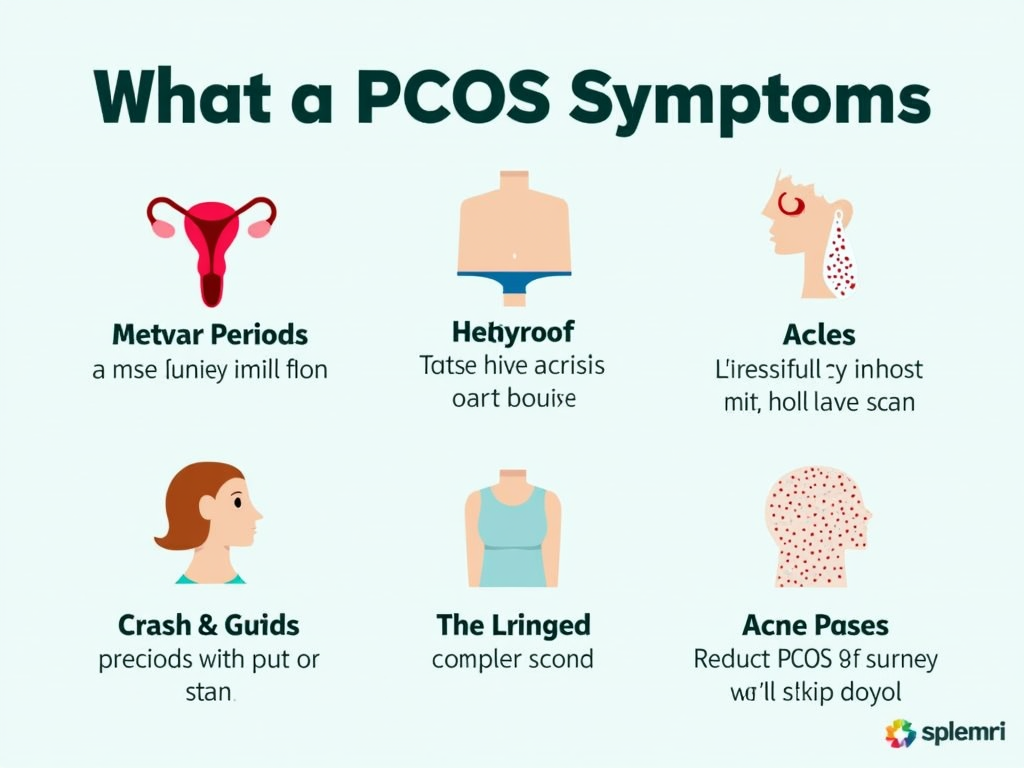Understanding PCOS: Symptoms, Management, and Expert Insights
March 24, 2025, 11:25 a.m.
Overview
Polycystic Ovary Syndrome (PCOS) affects millions of women worldwide. This hormonal disorder can cause irregular periods, infertility, and other health challenges. Understanding PCOS: Symptoms and Management is key to improving your quality of life. In this article, we’ll cover what you need to know and how to take control.
What is PCOS?
PCOS is a condition that impacts women during their reproductive years. It involves hormonal imbalances, often with higher levels of androgens (male hormones) and insulin resistance. While the exact cause isn’t clear, genetics and lifestyle factors play a role. Many women with PCOS have ovaries with small cysts, which can affect ovulation.
This disorder increases risks for diabetes and heart disease. It’s more common than you might think—up to 1 in 10 women may have it. Knowing what PCOS is helps you spot its signs early and seek help.

Symptoms of PCOS
PCOS symptoms differ for everyone. Here’s what you might notice:
- Irregular periods: Cycles may be too long, too short, or absent.
- Excess hair growth: Hair can appear on the face, chest, or back (called hirsutism).
- Acne or oily skin: Hormones can cause breakouts.
- Weight gain: Losing weight might feel harder.
- Hair thinning: Hair on your head may thin out.
- Skin changes: Dark patches or skin tags might show up.
- Infertility: Trouble getting pregnant is common.
Not every woman has all these signs. Some might only have a few, but they can still point to PCOS.

Diagnosis of PCOS
Getting a PCOS diagnosis starts with talking to a doctor. They’ll look at your symptoms and health history. Here’s how it usually works:
- Medical history: They’ll ask about your periods and family health.
- Physical exam: Checking for hair growth, acne, or weight changes.
- Blood tests: These measure hormone and insulin levels.
- Ultrasound: A scan can show cysts on your ovaries.
A reproductive endocrinologist specializing in PCOS can confirm it. They use criteria like the Rotterdam guidelines, which need two of three signs: irregular periods, high androgens, or polycystic ovaries.

Management and Treatment Options
Managing PCOS takes effort, but you can do it. Here are some ways to tackle it:
- Lifestyle changes: Eating well and staying active help with weight and insulin levels. Try whole foods and 30 minutes of exercise most days.
- Medications: Birth control pills can balance hormones. Metformin helps with insulin resistance. Anti-androgen drugs reduce hair growth.
- Fertility treatments: If you want to get pregnant, drugs like clomiphene can help you ovulate.
Regular check-ups keep you on track. A reproductive endocrinologist can guide you through tougher cases.

Role of a Reproductive Endocrinologist
A reproductive endocrinologist is your go-to expert for PCOS. They specialize in hormones and fertility, making them perfect for this condition. They can:
- Diagnose PCOS accurately.
- Create a plan just for you.
- Offer advanced fertility treatment if needed.
If infertility is a concern, their skills really shine. They’ll adjust treatments to fit your goals, whether it’s managing symptoms or starting a family.
Fertility Treatment and PCOS
Infertility can be a big worry with PCOS because ovulation might not happen regularly. Here’s what fertility treatment can offer:
- Ovulation drugs: Clomiphene or letrozole can kickstart your ovaries.
- Injections: Gonadotropins are stronger options if pills don’t work.
- IVF: In vitro fertilization is a high-tech choice for tougher cases.
Losing even a little weight can boost these treatments. A reproductive endocrinologist will help you find the best path.

Living with PCOS: Tips and Advice
Living with PCOS isn’t easy, but you’re not alone. Try these tips:
- Stay active: Walk, swim, or do yoga to feel better.
- Eat smart: Focus on veggies, lean proteins, and less sugar.
- Reduce stress: Try meditation or deep breathing.
- Get support: Join a group or talk to friends who get it.
Every woman’s PCOS is different. Keep trying things until you find what works for you.

Summary
PCOS is a hormonal challenge, but understanding PCOS: Symptoms and Management puts you in charge. From spotting symptoms to working with a reproductive endocrinologist, you can manage it. Take steps today—whether it’s eating better or seeking fertility treatment—and build a healthier future.